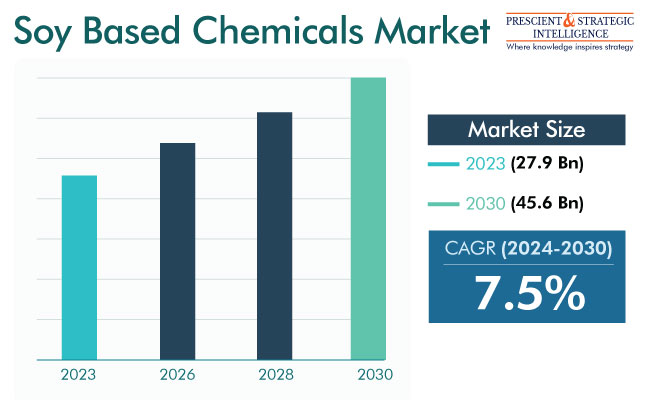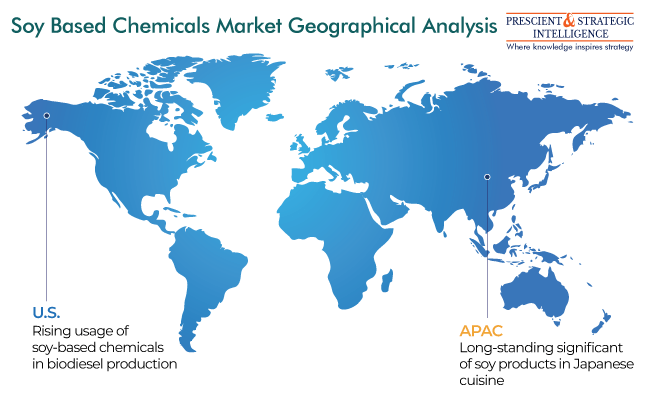Report Code: 10676 | Available Format: PDF
Soy Based Chemicals Market: Historical Size and Share Analysis, Future Growth Potential, Key Regions, Forecast till 2030
- Report Code: 10676
- Available Format: PDF
- Report Description
- Table of Contents
- Request Free Sample
Market Overview
The soy-based chemicals market revenue is USD 27.9 Billion (E) in 2023, and it will propel at 7.5 % compound annual growth rate during 2024–2030, to reach USD 45.6 Billion by 2030.
The advance of this industry is because of the rising worries of people regarding the consequences of fossil fuel consumption on the environment. This is leading to a shift in the preference of customers toward eco-friendly practices. This is why soy-based chemicals, which help substitute conventional chemicals made from crude oil, are witnessing increasing consumption. The most-popular derivative of soybean is soy milk, which is widely used in the food & beverage industry.

Moreover, soy oil has an enormous potential in the extraction of isoflavones, waxes, and polyols. Derivatives of this product are also used for the production of biodiesel, soaps, and biodegradable plastics. For instance, the Continental Refining Company is creating biodiesel and UltraBurn diesel blends using soybean oil. Furthermore, products derived from this legume are utilized in the cosmetics industry because of the constant rise in the levels of pollution.
Growing Demand for Soybeans Is Major Trend
The biggest trends in the global soy-based chemicals industry are the surging need for soybeans in the food & beverage sector and the rising utilization of bio-based products all over the world. In this regard, the growing vegan trend boosts the market advance, by leading to an increasing demand for proteins derived from sources other than animals.
Soy milk is especially popular among vegans and also those whose bodies cannot tolerate the lactose in conventional milk. Similarly, tempeh and tofu are two widely consumed soy products in East Asian cuisine and now becoming popular in other regions as well. As per reports, these products have a higher protein content than all conventional dairy products and nuts.
Surging Need for Eco-Friendly and Bio-Based Products To Boost Market
The rapid environmental degradation has resulted in strong worries regarding global warming, depletion of the ozone layer, urban sprawl, air pollution, acid rain, waste disposal, climate change, and water pollution. As a result, the utilization of bio-based chemicals, such as those derived from soy and other agricultural sources, will surge.
The soy-based chemicals industry has enormous opportunities in the industrial and consumer goods sectors, for instance, in insecticides, fertilizers, greases & lubricants, pesticides, food ingredients, detergents, and consumer packaging. Moreover, there has been a mounting need for eco-friendly chemicals for the production of deodorants and perfumes, which are now associated with personal hygiene as well as luxury. Similarly, the need for sustainable chemicals is rising in the industrial polymers, cleaning chemicals, plastics, and pharma ingredients.
| Report Attribute | Details |
Market Size in 2023 |
USD 27.9 Billion (E) |
Revenue Forecast in 2030 |
USD 45.6 Billion |
Growth Rate |
7.5% CAGR |
Historical Years |
2017-2023 |
Forecast Years |
2024-2030 |
Report Scope |
Market Trends, Drivers, and Restraints; Revenue Estimation and Forecast; Segmentation Analysis; Impact of COVID-19; Companies’ Strategic Developments; Market Share Analysis of Key Players; Company Profiling |
Explore more about this report - Request free sample
Rising Investment in Renewable Chemicals Offers Opportunities
The rising funding for the manufacturing of renewable chemicals across developing nations is likely to create major opportunities for the industry during this decade. The world is facing the issue of the declining supply of low-priced power sources, which are majorly fossil fuels, as well as climate change.
Renewable sources possess the possibility to counter these issues. Bio-based chemicals present prospects for the substitution of petrochemicals with products derived from nature. Moreover, organic product manufacturers are focusing on making them competitive in terms of price in the long run. Although industrial biotechnology offers the potential to create value-added chemicals from plant sources, various advancements need to be brought about in production techniques to attain a commercially viable capacity.
Therefore, the rising investments across developing nations for promoting renewable chemicals will generate opportunities for bio-based product commercialization. For instance, in 2020, the Indian government announced viability gap funding of INR 1,500 million for every low-carbon biofuel plant. Similarly, in February 2023, CEF Group announced plans to invest INR 650 crore in biofuel production in the Indian state of Uttar Pradesh.
Soy Oil Category Is Major Revenue Contributor
The soy oil category, based on type, is the major revenue contributor to the industry, and it is likely to observe high growth till the end of this decade.
Derivatives of soy oil, for instance, methyl soyate, polyols, and isoflavones, have observed a massive surge in their application in different sectors. Soybean oil is itself widely used in cooking as a substitute for animal fats, including ghee, lard, and butter. Moreover, it is used for nourishing the hair and as a moisturizer on the skin. Further, it has application as a carrier oil, being used to dilute other essential oils, before being applied to the skin.
Moreover, the soy wax category is likely to propel at a high rate during the forecast period. This is because of the surging utilization of this product in candles. Candles are widely used for religious and aesthetic purposes, which drives the demand for wax. Compared to conventional wax, that made from soy chemicals burns more slowly, preserves the scent of candles, and releases fewer emissions. Moreover, when burned, soy candles do not produce as much heat, so the risk of burns to fingers is lower.
Plastics and Polymers Are Significant under Application Segment
The plastics and polymers category, based on application, accounts for a major share of the industry, and it is likely to observe impressive growth throughout this decade. There has been a surging need for biodegradable plastics all over the world due to the mounting attention on environmental protection. Moreover, the strict regulations against the utilization of traditional plastics and polymers are likely to boost the utilization of soy chemicals in plastic manufacturing in the years to come.
As per reports, USD 500 million had been poured into bioplastic production in the first quarter of 2022, compared to USD 350 million in the last three years of the previous year. This is being done to slow down the rate of environmental harm by plastic pollution. As per the UNEP, up to 23 million tonnes of conventional polymers are dumped into the world’s waterbodies each year. These materials can take up to 500 years to decompose on their own, in the meantime becoming food for birds and aquatic creatures and harming their health.
Top Soy-Based Chemicals Producers Are:
- Dow Inc.
- Archer-Daniels-Midland Company
- Cara Plastics Inc.
- Cargill Inc.
- Ag Environmental Products LLC
- Elevance Renewable Sciences Inc.
- Renewable Lubricants Inc.
- Soy Technologies LLC
- Vertec Biosolvents Inc.
- Soyaworld Inc.
- Cara Plastics Inc.
- Bunge Ltd.
- LANXESS AG
- Vitasoy USA Inc.
North America Is Market Leader
North America is leading the soy-based chemicals industry, and it is expected to propel at a strong rate throughout this decade. The continent is observing a considerable surge in the emphasis on sustainability, which is boosting the need for bio-based chemicals and products. Moreover, the surging funding for the production of biodiesels and various other renewable goods is expected to boost the requirement for soy chemicals in the region in the years to come.

The APAC soy-based chemicals industry is likely to propel at a high compound annual growth rate during the projection period. This is because of the lucrative opportunities for the manufacturers of such goods. Furthermore, the existence of a massive agriculture sector, growing need for bio-based products, helpful initiatives from the government, long-standing popularity of soy-based proteins, and rising funding in renewable power generation are boosting the market advance.
Want a report tailored exactly to your business strategy?
Request CustomizationWant an insight-rich discussion with the report author?
Speak to AnalystOur dedication to providing the most-accurate market information has earned us verification by Dun & Bradstreet (D&B). We strive for quality checking of the highest level to enable data-driven decision making for you
Our insights into the minutest levels of the markets, including the latest trends and competitive landscape, give you all the answers you need to take your business to new heights
With 24/7 research support, we ensure that the wheels of your business never stop turning. Don’t let time stand in your way. Get all your queries answered with a simple phone call or email, as and when required
We take a cautious approach to protecting your personal and confidential information. Trust is the strongest bond that connects us and our clients, and trust we build by complying with all international and domestic data protection and privacy laws